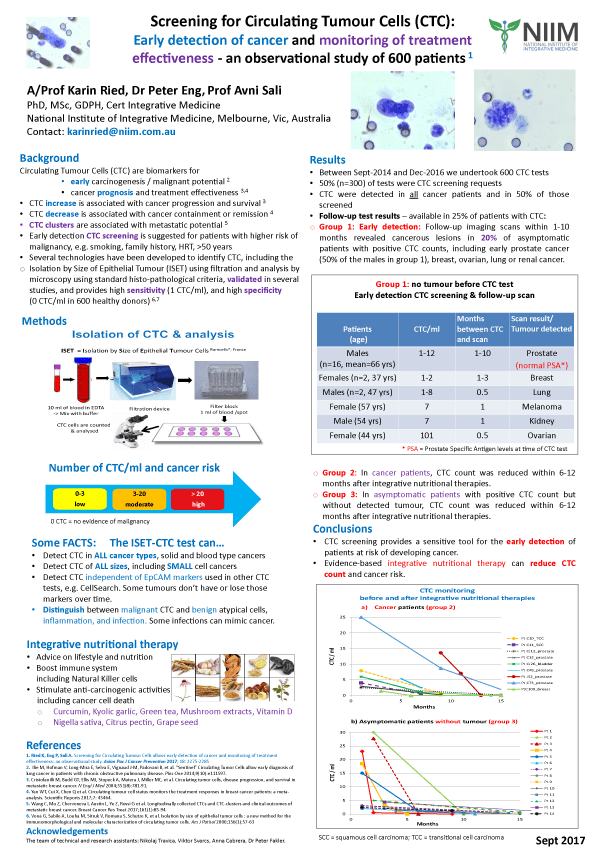NIIM conducts the Circulating Tumour Cells (CTC) Test as part of a clinical study.
This study is registered on the Australia New Zealand Clinical Trial Registry as observational (non-interventional) study, and has been approved by an NHMRC registered ethics committee.
This observational CTC study uses the ISET® system, developed by Rarecells Diagnostics SAS, France to detect Circulating Tumour Cells (CTC) and other potential chronic conditions arising from detectable pathogens. The ISET® system is CE IVD certified and is compliant with the European In Vitro Diagnostics Regulations.
The CTC blood test is a one-point-in-time screening test.
Our study aims to
- Assist in monitoring treatment effectiveness in cancer patients by CTC Testing before and after treatment
- Screen for CTC to assist in early diagnosis of potential malignancy
- Screen for other rare cells
- Assess utility of the ISET-CTC test in clinical practice
What is Circulating Tumour Cell (CTC) analysis?
The ISET-CTC Test
- The ISET-CTC Test is a screening test not a diagnostic test
- CTC’s are Circulating Tumour Cells in the blood
- CTC’s are well-established biomarkers which can potentially assist with early cancer detection and assessment of treatment effectiveness
- The ‘CTC count’ (number of CTC’s per sample analysed) indicates the potential risk of malignancy and possibly the stage of cancer
- The ‘Isolation by SizE of Tumour (ISET) CTC’ test uses filtration and standard cytological microscopy, validated in more than 80+ peer-reviewed articles over the last 20 years. Articles can be downloaded at: https://www.rarecells.com/iset-publications-in-oncology
- As of Aug 2024, NIIM has conducted over 4,200 CTC tests.
- Some facts about ISET-CTC Test
What does the CTC screening test involve?
- A doctor’s referral is required to book in for the ISET-CTC blood test.
Contact: research@niim.com.au for the CTC test request form - Bloods tests can be done at NIIM or your local pathology lab. There is no need to fast for this blood test.
- For interstate patients, please request a test kit, which includes blood tubes, packaging material, and a courier return envelope.
- Your blood will be analysed locally at NIIM’s research facility in Hawthorn.
- The CTC report will be sent to your referring doctor to discuss with you. The turn-around time is usually 2 weeks.
The CTC test is not a standalone diagnostic test, and should be interpreted together with other clinical patient data.
2. Poster presented at the COSA 2017 conference https://onlinelibrary.wiley.com/doi/full/10.1111/ajco.12799

2. Ried K, Tamanna T, Matthews S, Eng P, Sali A. New Screening Test improves Detection of Prostate Cancer using Circulating Tumour Cells and Prostate-specific Markers. Frontiers Oncol Apr 2020, 10, 582. https://www.frontiersin.org/articles/10.3389/fonc.2020.00582/full
News
Listen to A/Prof Karin Ried on a ‘Metagenics Clinical Podcast’ – Screening for Circulating Tumour Cells (CTC) – June 17, 2020
Prostate Cancer Screening Test
Information for Practitioners and Participants
Participation in the CTC trial is by practitioner’s referral only.
For more information & Expressions of Interest
View ANZ Clinical trial registry
Contact the NIIM Research Team
E: research@niim.com.au
Some FACTS about the ISET-CTC Test:
- FACT 1: The ISET-CTC test has the potential to detect twelve different types of cancer inclduing prostrate and breast.
- FACT 2: The ISET-CTC test can detect small cell cancer cells. ISET-CTC (Isolation by SizE of Tumour Cells) testing by microfiltration can detect cancer cells of all sizes. Cancer cells usually are larger than 8 microns (the ISET filter hole size), including solid tumour cells of 11.7-23.8 microns, small-cell type cancers (e.g. small cell lung carcinoma of 7.2-10 microns) and blood type cancers (e.g. leukemia cells of 8.9-15.3 microns).
- FACT 3: The ISET-CTC can detect Circulating Tumour Cells (CTC) independent of the presence of Epithelial Cell Adhesion Molecule (EpCAM) markers.
– Some tumour cells do not have EpCAM markers, e.g. blood type tumours. -> FALSE NEGATIVES
– Tumour cells consistently undergo change and may lose EpCAM markers over time. -> FALSE NEGATIVES
– Immune cells can display EpCAM markers, and in an inflammatory condition, this can produce FALSE POSITIVES - FACT 4: The ISET-CTC testing can distinguish between malignant Circulating Tumour Cells (CTC) and benign Circulating Epithelial Cells (CEC).
References
About ISET-CTC – https://www.rarecells.com/clinical-applications-2
80+ peer-reviewed articles on ISET-CTC testing are available at: https://www.rarecells.com/iset-publications-in-oncology
Key articles:
- Ilie M et al. “Sentinel” Circulating Tumor Cells allow early diagnosis of lung cancer in patients with chronic obstructive pulmonary disease. Plos One 2014;9(10):e111597.
- Cristofanilli M et al. Circulating tumor cells, disease progression, and survival in metastatic breast cancer. N Engl J Med 2004;351(8):781-91.
- Yan WT et al. Circulating tumour cell status monitors the treatment responses in breast cancer patients: a meta-analysis. Scientific Reports 2017;7: 43464.
- Wang C et al. Longitudinally collected CTCs and CTC-clusters and clinical outcomes of metastatic breast cancer. Breast Cancer Res Treat 2017;161(1):83-94.
- Vona G et al. Isolation by size of epithelial tumor cells : a new method for the immunomorphological and molecular characterization of circulating tumor cells. Am J Pathol 2000;156(1):57-63.
- Laget S et al. Technical insights into highly sensitive isolation and molecular characterization of fixed and live circulating tumor cells for early detection of tumor invasion. PloS One 2017, 12(1), p.e0169427.
- Ried K, Eng P, Sali A. Screening for Circulating Tumour Cells allows early detection of cancer and monitoring of treatment effectiveness: an observational study. Asian Pac J Cancer Prev 2017; 18: 2275-2285.
- Ried K, Tamanna T, Matthews S, Eng P, Sali A. New Screening Test improves Detection of Prostate Cancer using Circulating Tumour Cells and Prostate-specific Markers. Frontiers Oncol Apr 2020, 10, 582. https://www.frontiersin.org/articles/10.3389/fonc.2020.00582/full
